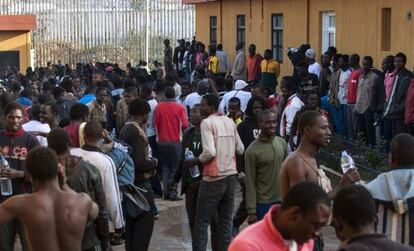Spain’s immigration and anti-racism agencies left languishing
Funding for integration policies slashed despite experts warning of risk of Paris-like unrest

Immigrants assaulted at the Ceuta and Melilla borders, young Spaniards recruited as jihadist combatants, or other Spaniards who think foreigners are stealing their kindergarten spots or welfare grants... Avoiding such problems and prejudices requires careful work by the government, but two Spanish public agencies devoted to analyzing them have been languishing for lack of funds and leadership.
The Permanent Observatory on Immigration (OPI) was without a director for a year until October, while the Spanish Observatory on Racism and Xenophobia (Oberaxe) has been headless for the last three months.
The good thing is they are not trying to use immigrants as scapegoats, the bad thing is they are not encouraging coexistence policies, either”
José Antonio Moreno, CC OO labor union
These monitoring bodies produce studies on immigration-related issues, gauging the success of the integration of migrants into society, the education system and the labor market, issuing policy guidelines and evaluating Spaniards’ attitude to foreigners.
Some analysts say the current center-right Popular Party (PP) administration is deliberately neglecting the bodies, and warn about the risks of not doing enough to bring migrants into the fold of Spanish society.
“Everything that had been created is being dismantled,” says Miguel Pajares, a sociologist at Madrid’s Complutense University who drafted the OPI’s annual immigration and job market report until 2010. After he left the agency, there was one more report in 2011, and then there were no more after that.
“It’s not just about the figures. What’s at stake here is having Spain evolve towards a disintegrated society that could produce street riots like the ones we saw in the suburbs of Paris,” he says, in reference to the 2005 uprisings in the poorest neighborhoods of the French capital.
But Esteban Ibarra, president of the advocacy group Movimiento contra la Intolerancia (Movement against Intolerance), says the previous Socialist administration is as much to blame as the current conservative one.
“The Observatories never had the relevance they should have had, either under the PSOE or under the PP,” he notes. “We need to consider the roots of the problem, and neither one of these agencies is prepared for that.”
A spokesman for the Labor Ministry, which both OPI and Oberaxe answer to, attributed the prolonged lack of leadership at both to the “usual” appointment procedure, and said that both agencies continue to produce a significant amount of research.
But the monthly bulletins on racism and xenophobia stopped coming out in 2011, and the quarterly reports on the evolution of foreigners with residency cards now get published every six months. The last one came out in June 2014.
“Immigration has fallen off the political agenda,” says José Antonio Moreno, of the CC OO labor union. “The PP is trying to make it invisible. The good thing is they are not trying to use immigrants as scapegoats, the bad thing is they are not encouraging coexistence policies, either,” he says.
In early 2012, the newly elected PP government eliminated a state program that funded immigrant integration measures, including reinforcement classes at schools. This program had already been languishing for two years before that, going from a budget of €100 million in 2010 to €66 million the following year.
“With these cuts, the message they are sending out is that integration is solely the immigrant’s obligation, rather than a process that affects those who come here but also the rest of society,” says Ana Corral, of labor union UGT.
“It’s an ideological issue: on one hand, they keep the immigrants out of the health system, and on the other they arrest the Islamic State people. The integration effort goes beyond the Interior Ministry,” says Esperanza Esteve, a Socialist deputy. “They have ruined the big-picture vision of this matter.”
Tu suscripción se está usando en otro dispositivo
¿Quieres añadir otro usuario a tu suscripción?
Si continúas leyendo en este dispositivo, no se podrá leer en el otro.
FlechaTu suscripción se está usando en otro dispositivo y solo puedes acceder a EL PAÍS desde un dispositivo a la vez.
Si quieres compartir tu cuenta, cambia tu suscripción a la modalidad Premium, así podrás añadir otro usuario. Cada uno accederá con su propia cuenta de email, lo que os permitirá personalizar vuestra experiencia en EL PAÍS.
¿Tienes una suscripción de empresa? Accede aquí para contratar más cuentas.
En el caso de no saber quién está usando tu cuenta, te recomendamos cambiar tu contraseña aquí.
Si decides continuar compartiendo tu cuenta, este mensaje se mostrará en tu dispositivo y en el de la otra persona que está usando tu cuenta de forma indefinida, afectando a tu experiencia de lectura. Puedes consultar aquí los términos y condiciones de la suscripción digital.









































